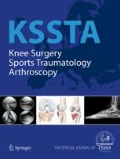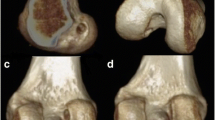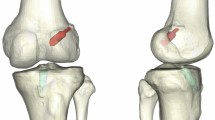Abstract
Purpose
Femoral tunnel angle (FTA) has been proposed as a metric for evaluating whether ACL reconstruction was performed anatomically. In clinic, radiographic images are typically acquired with an uncertain amount of internal/external knee rotation. The extent to which knee rotation will influence FTA measurement is unclear. Furthermore, differences in FTA measurement between the two common positions (0° and 45° knee flexion) have not been established. The purpose of this study was to investigate the influence of knee rotation on FTA measurement after ACL reconstruction.
Methods
Knee CT data from 16 subjects were segmented to produce 3D bone models. Central axes of tunnels were identified. The 0° and 45° flexion angles were simulated. Knee internal/external rotations were simulated in a range of ±20°. FTA was defined as the angle between the tunnel axis and femoral shaft axis, orthogonally projected into the coronal plane.
Results
Femoral tunnel angle was positively/negatively correlated with knee rotation angle at 0°/45° knee flexion. At 0° knee flexion, FTA for anterio-medial (AM) tunnels was significantly decreased at 20° of external knee rotation. At 45° knee flexion, more than 16° external or 19° internal rotation significantly altered FTA measurements for single-bundle tunnels; smaller rotations (±9° for AM, ±5° for PL) created significant errors in FTA measurements after double-bundle reconstruction.
Conclusion
Femoral tunnel angle measurements were correlated with knee rotation. Relatively small imaging malalignment introduced significant errors with knee flexed 45°. This study supports using the 0° flexion position for knee radiographs to reduce errors in FTA measurement due to knee internal/external rotation.
Level of evidence
Case–control study, Level III.



Similar content being viewed by others
References
Celentano U, Cardoso MP, Martins CA, Ramirez CP, van Eck CF, Smolinski P, Fu FH (2012) Use of transtibial aimer via the accessory anteromedial portal to identify the center of the ACL footprint. Knee Surg Sports Traumatol Arthrosc 20:69–74
Forsythe B, Kopf S, Wong AK, Martins CA, Anderst W, Tashman S, Fu FH (2010) The location of femoral and tibial tunnels in anatomic double-bundle anterior cruciate ligament reconstruction analyzed by three-dimensional computed tomography models. J Bone Joint Surg Am 92:1418–1426
Gelber PE, Erquicia J, Abat F, Torres R, Pelfort X, Rodriguez-Baeza A, Alomar X, Monllau JC (2011) Effectiveness of a footprint guide to establish an anatomic femoral tunnel in anterior cruciate ligament reconstruction: computed tomography evaluation in a cadaveric model. Arthroscopy 27:817–824
Gensburger D, Roux JP, Arlot M, Sornay-Rendu E, Ravaud P, Chapurlat R (2010) Influence of blinding sequence of radiographs on the reproducibility and sensitivity to change of joint space width measurement in knee osteoarthritis. Arthr Care Res 62:1699–1705
Giron F, Cuomo P, Edwards A, Bull AM, Amis AA, Aglietti P (2007) Double-bundle “anatomic” anterior cruciate ligament reconstruction: a cadaveric study of tunnel positioning with a transtibial technique. Arthroscopy 23:7–13
Grood ES, Suntay WJ (1983) A joint coordinate system for the clinical description of three-dimensional motions: application to the knee. J Biomech Eng 105:136–144
Hoser C, Tecklenburg K, Kuenzel KH, Fink C (2005) Postoperative evaluation of femoral tunnel position in ACL reconstruction: plain radiography versus computed tomography. Knee Surg Sports Traumatol Arthrosc 13:256–262
Hosseini A, Lodhia P, Van de Velde SK, Asnis PD, Zarins B, Gill TJ, Li G (2012) Tunnel position and graft orientation in failed anterior cruciate ligament reconstruction: a clinical and imaging analysis. Int Orthop 36:845–852
Hunt MA, Fowler PJ, Birmingham TB, Jenkyn TR, Giffin JR (2006) Foot rotational effects on radiographic measures of lower limb alignment. Can J Surg 49:401–406
Illingworth KD, Hensler D, Working ZM, Macalena JA, Tashman S, Fu FH (2011) A simple evaluation of anterior cruciate ligament femoral tunnel position: the inclination angle and femoral tunnel angle. Am J Sports Med 39:2611–2618
Jarvela T (2007) Double-bundle versus single-bundle anterior cruciate ligament reconstruction: a prospective, randomize clinical study. Knee Surg Sports Traumatol Arthrosc 15:500–507
Kinds MB, Vincken KL, Hoppinga TN, Bleys RL, Viergever MA, Marijnissen AC, Welsing PM, Lafeber FP (2012) Influence of variation in semiflexed knee positioning during image acquisition on separate quantitative radiographic parameters of osteoarthritis, measured by knee images digital analysis. Osteoarthr Cartil 20:997–1003
Krackow KA, Pepe CL, Galloway EJ (1990) A mathematical analysis of the effect of flexion and rotation on apparent varus/valgus alignment at the knee. Orthopedics 13:861–868
Lertwanich P, Martins CA, Asai S, Ingham SJ, Smolinski P, Fu FH (2011) Anterior cruciate ligament tunnel position measurement reliability on 3-dimensional reconstructed computed tomography. Arthroscopy 27:391–398
Magnussen RA, Debieux P, Benjamin B, Lustig S, Demey G, Servien E, Neyret P (2012) A CT-based classification of prior ACL femoral tunnel location for planning revision ACL surgery. Knee Surg Sports Traumatol Arthrosc 20:1298–1306
Mazzuca SA, Brandt KD, Dieppe PA, Doherty M, Katz BP, Lane KA (2001) Effect of alignment of the medial tibial plateau and x-ray beam on apparent progression of osteoarthritis in the standing anteroposterior knee radiograph. Arthr Rheum 44:1786–1794
Misonoo G, Kanamori A, Ida H, Miyakawa S, Ochiai N (2012) Evaluation of tibial rotational stability of single-bundle vs. anatomical double-bundle anterior cruciate ligament reconstruction during a high-demand activity—a quasi-randomized trial. Knee 19:87–93
Oiestad BE, Holm I, Aune AK, Gunderson R, Myklebust G, Engebretsen L, Fosdahl MA, Risberg MA (2010) Knee function and prevalence of knee osteoarthritis after anterior cruciate ligament reconstruction: a prospective study with 10 to 15 years of follow-up. Am J Sports Med 38:2201–2210
Siebold R (2011) The concept of complete footprint restoration with guidelines for single- and double-bundle ACL reconstruction. Knee Surg Sports Traumatol Arthrosc 19:699–706
Swanson KE, Stocks GW, Warren PD, Hazel MR, Janssen HF (2000) Does axial limb rotation affect the alignment measurements in deformed limbs? Clin Orthop Relat Res 371:246–252
Vignon E, Brandt KD, Mercier C, Hochberg M, Hunter D, Mazzuca S, Powell K, Wyman B, Le Graverand MP (2010) Alignment of the medial tibial plateau affects the rate of joint space narrowing in the osteoarthritic knee. Osteoarthr Cartil 18:1436–1440
Wang JH, Kim JG, Ahn JH, Lim HC, Hoshino Y, Fu FH (2012) Is femoral tunnel length correlated with the intercondylar notch and femoral condyle geometry after double-bundle anterior cruciate ligament reconstruction using the transportal technique? An in vivo computed tomography analysis. Arthroscopy 28:1094–1103
Yagi M, Kuroda R, Nagamune K, Yoshiya S, Kurosaka M (2007) Double-bundle ACL reconstruction can improve rotational stability. Clin Orthop Relat Res 454:100–107
Yagi M, Wong EK, Kanamori A, Debski RE, Fu FH, Woo SL (2002) Biomechanical analysis of an anatomic anterior cruciate ligament reconstruction. Am J Sports Med 30:660–666
Yasuda K, Kondo E, Ichiyama H, Tanabe Y, Tohyama H (2006) Clinical evaluation of anatomic double-bundle anterior cruciate ligament reconstruction procedure using hamstring tendon grafts: comparisons among 3 different procedures. Arthroscopy 22:240–251
Conflict of interest
The authors declare that they have no conflict of interest.
Author information
Authors and Affiliations
Corresponding author
Rights and permissions
About this article
Cite this article
Tang, J., Thorhauer, E., Marsh, C. et al. Knee rotation influences the femoral tunnel angle measurement after anterior cruciate ligament reconstruction: a 3-dimensional computed tomography model study. Knee Surg Sports Traumatol Arthrosc 22, 1505–1510 (2014). https://doi.org/10.1007/s00167-013-2504-1
Received:
Accepted:
Published:
Issue Date:
DOI: https://doi.org/10.1007/s00167-013-2504-1




